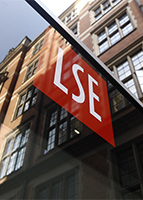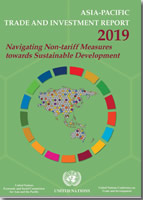The year 2015 has witnessed a significant directional shift in the development paradigm. Member States of the United Nations negotiated a new development agenda for 2015–2030 applicable to all countries, not only to those of the developing world.
The primary focus is to achieve development that is sustainable in the social, economic and environmental spheres. Many linkages exist between NTMs and the sustainable development goals.
To understand how NTMs interact with sustainable development, it is helpful to distinguish between indirect and direct linkages.
-
Indirect linkage means that NTMs influence trade. In turn, trade can foster economic development and spill over to sustainable development.
-
Direct linkages refer to policies that have an immediate effect on sustainability.
Direct and indirect linkages: NTMs and the SDGs

This post by by Christian Knebel and Ralf Peters of UNCTAD explores the role of trade sustainability in achieving the new SDGs. It is part of the IGC, South Asia @ LSE and Africa @ LSE cross-blog series on the Sustainable Development Goals.
Asia-Pacific Trade and Investment Report 2019

This joint UNCTAD-ESCAP report exams the links between NTMs and sustainable development, the impact of NTMs in Asia and the Pacific, and how to best navigate NTMs towards sustainable development, building on good practices at the national, regional, and multilateral levels.
- Goal 2: Zero Hunger
-
Indirect linkage:
NTMs, as trade measures, could be designed in a way to restrict trade and to create distortions in world agricultural market (e.g. agricultural export subsidies and other export measures with equivalent effect, NTM Code P7 or P8, for example). This in turn will hinder worldwide food security. (Target 2.b.)
Direct linkage:
Governments can design policies to ensure sustainable good productions systems and promote agriculture practices that increase productivity and production, and help maintain ecosystems (Target 2.4). These policies could be requirements on plant-growth process (NTM Code A61), food and feed processing (NTM Code A63), or TBT regulations on production processes (NTM Code B41). They eventually have an impact on trade as exporting countries need to strive to fulfill those requirements to access the market.
- Goal 3: Good Health and Well-Being
-
Direct linkage:
Policies designed to prevent substance abuse, including narcotic drug abuse and harmful use of alcohol (Target 3.5) can lead to more restrictions on the importation of these products such as requirements on registration for importers of sensitive products (NTM Code B15), requirements on authorization or permits (NTM Code B14), or even full prohibition (NTM Code B11). Requirements on restricting under-age consumers of tobacco (Target 3.a.1 of Goal 3) might require governments to establish mandatory labelling obligation for tobacco products, including warning label, which in turn affect trade (NTM Code B31 - labelling requirements, and NTM Code B32 - marking requirements)
- Goal 8: Decent Work and Economic Growth
-
Direct linkage:
Governments can design policies to eradicate forced labour, protect labours right and promote safe and secure working environments (Target 8.7 and 8.8) - those policies might affect trade and they then correspond to NTM Code B4 - Production or post-production requirements.
For example, cotton imported into Country A needs to come with a certificate (NTM Code B83) proving that it was not picked by child labour (NTM Code B41).
- Goal 11: Sustainable Cities and Communities
-
Direct linkage:
Target 11.4 - protect and safeguard the world's cultural and natural heritage - is in line with the view of various governments in the world. NTM Code E121 - licensing for religious, moral, or cultural reasons, and NTM Code P13 - licensing or permit requirements for exports, can be found in the NTM Database of many countries, where governments aim to control the importation and exportation of cultural and natural heritages. Cambodia, for example, regulates both the importation and exportation of cultural heritage (such as Khmer stone sculpture and architectural elements). These measures can be found in our NTM Database.
- Goal 12: Responsible Consumption and Production
-
Direct linkage:
Target 12.4 - sound management of chemicals and all wastes throughout their life cycle - requires tight control of importation and exportation of chemicals and wastes. To reach this target, governments worldwide are applying different measures on waste and chemicals trade such as NTM Code B14 - Authorization requirement for TBT reasons, B11 - Prohibition (of imports) for TBT reasons, and P13 - Licensing or permit requirements to export, or P14 - Export registration requirements. Other requirements such as labelling (B31), marking (B32), packaging (B33), testing (B82), or inspection (B84) are also commonly used to govern chemicals. Measures controlling the trading of wastes and chemicals, especially harmful chemicals, are abundant in the NTM database of UNCTAD.
- Goal 14: Life Below Water
-
Direct linkage:
Target 14.4 aims at ending over fishing and regulating fish harvesting in a sustainable way. Various policies answer to this target, for example, ban on fish harvesting at certain timing of the season, requirements on the size of fish/other aquatic animals, ban on certain fishing techniques such as using mines. When governments require the imported and/or exported fish/aquatic products to meet the same requirements, trade of fish and aquatic products will be affected. The NTM database reflects those requirements with various NTM Codes such as B41 - TBT regulations on production process (such as fishing process).
Indirect linkage:
Target 14.6 aims at abolishing fisheries subsidies that lead to overcapacity and over fishing. To analyze the ability of removing them, researchers and lawmakers can find in the NTM database of UNCTAD data on subsidies - NTM Code L (import subsidies) and P7 (export subsidies). Removing the subsidies and reducing trade of fish that is illegally or over caught will foster the sustainable use of the oceans, seas and marine resources.
- Goal 15: Life on Land
-
Direct linkage:
Target 15.8 on preventing the introduction and reducing the impact of invasive alien species can be translated into policies that regulate the importation of alien species to a new area. In this regard, many countries have put into place policies that prohibit the importation into the country of alien species unless special permit is granted (NTM Code B14), that require importers to register should they wish to import certain species (NTM Code B15), that require disclosure of the origin of materials and parts in the final product (NTM Code B851).
Indirect linkage:
Target 15.7 is about addressing demand and supply for illegal wildlife products to end poaching and trafficking of protected species of flora and fauna. NTMs prohibiting the trading of illegal wildlife products such as B11 - Prohibition for TBT reasons, or P11 - Export prohibition, play an important role in reducing the supply/demand of those products, as stricter/more regulated trade means lesser poaching and trafficking activities.
A larger part of countries where the NTM codes are selected adopt CITES as the base of their policies on regulating the trade of protected species of flora and fauna.
- Goal 16: Peace, Justice and Strong Institutions
-
Direct linkage:
In order to achieve part of Target 16.4 - reducing arms flows - policies to regulate the importation and exportation of arms need to be put in place. Various measures such as B14 - authorization, B7 - product quality requirement, B82 - testing requirement, B84 - inspection requirement, P13 - permit to export, are applied by governments to control the flow of guns, explosives and other types of arms from one country to another.
- Goal 17: Partnerships for The Goals
-
The NTM database built and updated by UNCTAD serves various targets of Goal 17.
The database consists of universal NTM codes reflecting all trade-related requirements that are not tariffs, which contributes to open and equitable multilateral trading system (Target 17.10), provides information for developing countries to access markets and increase their exports (Target 17.11), provides information on rules of origin that will be applicable to imports from least developed countries and facilitate market access (Target 17.12).
UNCTAD has been working with partners worldwide including the governments to collect, disseminate, and analyze the NTM data, as part of our work on policy coordination and policy coherence (Target 17.13).


